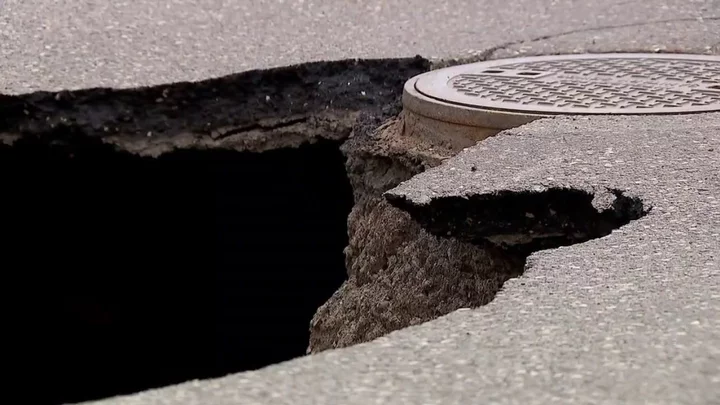Man vanishes without a trace after sinkhole swallows up his bedroom while he sleeps
It’s been 10 years since Jeffrey Bush disappeared in his own home, and no trace of him has ever been found. The 37-year-old was asleep in bed at his home in Seffner, Florida, when the ground caved in around him, swallowing him into a massive sinkhole. On the night of February 28, 2013, his brother Jeremy heard a loud crash and ran into Jeffrey’s room only to find a vast crater in place of his sibling’s bed. Jeremy jumped into the hole in a desperate bid to rescue his brother but was swiftly pulled to safety as the ground around him continued to cave in. Sign up for our free Indy100 weekly newsletter "The floor was still giving in and the dirt was still going down, but I didn't care. I wanted to save my brother," he told The Guardian at the time. "But I just couldn't do nothing. "I could swear I heard him hollering my name to help him." Within minutes, local law enforcement had arrived and engineers lowered a microphone into the pit to try to pick up signs of Jeffrey. However, a second collapse sucked the equipment down into the sinkhole and the property was deemed too dangerous for rescue or recovery. Video released of Seffner sinkhole that claimed life of Jeff Bush youtu.be The house was subsequently fenced off and eventually demolished, with the gaping 20ft-wide cavity filled in with gravel. But then, more than two years later, on August 19, 2015, the hole reopened. Specialists at the time pointed out that it was very rare to see such a phenomenon reemerge in the exact same spot. Florida is particularly susceptible to sinkholes as it is home to a high number of underground caverns which are made up of limestone, a rock which easily dissolves in water. In fact, they’re so common, that state law requires home insurers to provide coverage against the danger. And, indeed, someone had visited the Stevens’ home just weeks before the tragedy to check for sinkholes and other risks on the property, apparently for insurance purposes. "[The inspector] said there was nothing wrong with the house. Nothing,” Jeremy told The Guardian. “And a couple of months later, my brother dies. In a sinkhole.” So what happened to Jeffrey’s body? Well, Philip van Beynen, a University of South Florida environmental scientist, concluded that it had most likely dropped into a 60ft-tall water-filled void between the sinkhole and the lower bedrock. The body would have sunk much deeper than the gravel pit seen from the street, van Beynen told USA Today. He stressed that any attempt to retrieve it would have been unwise, if not impossible, as the ground around the hole could have collapsed as well. "It would be extraordinarily difficult and incredibly expensive," he noted. Still, that’s little comfort to the Stevens’ who never got to bury their loved-one or, even, to properly say goodbye. Have your say in our news democracy. Click the upvote icon at the top of the page to help raise this article through the indy100 rankings.
It’s been 10 years since Jeffrey Bush disappeared in his own home, and no trace of him has ever been found.
The 37-year-old was asleep in bed at his home in Seffner, Florida, when the ground caved in around him, swallowing him into a massive sinkhole.
On the night of February 28, 2013, his brother Jeremy heard a loud crash and ran into Jeffrey’s room only to find a vast crater in place of his sibling’s bed.
Jeremy jumped into the hole in a desperate bid to rescue his brother but was swiftly pulled to safety as the ground around him continued to cave in.
Sign up for our free Indy100 weekly newsletter
"The floor was still giving in and the dirt was still going down, but I didn't care. I wanted to save my brother," he told The Guardian at the time. "But I just couldn't do nothing.
"I could swear I heard him hollering my name to help him."
Within minutes, local law enforcement had arrived and engineers lowered a microphone into the pit to try to pick up signs of Jeffrey.
However, a second collapse sucked the equipment down into the sinkhole and the property was deemed too dangerous for rescue or recovery.
Video released of Seffner sinkhole that claimed life of Jeff Bush youtu.be
The house was subsequently fenced off and eventually demolished, with the gaping 20ft-wide cavity filled in with gravel.
But then, more than two years later, on August 19, 2015, the hole reopened.
Specialists at the time pointed out that it was very rare to see such a phenomenon reemerge in the exact same spot.
Florida is particularly susceptible to sinkholes as it is home to a high number of underground caverns which are made up of limestone, a rock which easily dissolves in water.
In fact, they’re so common, that state law requires home insurers to provide coverage against the danger.
And, indeed, someone had visited the Stevens’ home just weeks before the tragedy to check for sinkholes and other risks on the property, apparently for insurance purposes.
"[The inspector] said there was nothing wrong with the house. Nothing,” Jeremy told The Guardian. “And a couple of months later, my brother dies. In a sinkhole.”
So what happened to Jeffrey’s body?
Well, Philip van Beynen, a University of South Florida environmental scientist, concluded that it had most likely dropped into a 60ft-tall water-filled void between the sinkhole and the lower bedrock.
The body would have sunk much deeper than the gravel pit seen from the street, van Beynen told USA Today.
He stressed that any attempt to retrieve it would have been unwise, if not impossible, as the ground around the hole could have collapsed as well.
"It would be extraordinarily difficult and incredibly expensive," he noted.
Still, that’s little comfort to the Stevens’ who never got to bury their loved-one or, even, to properly say goodbye.
Have your say in our news democracy. Click the upvote icon at the top of the page to help raise this article through the indy100 rankings.









